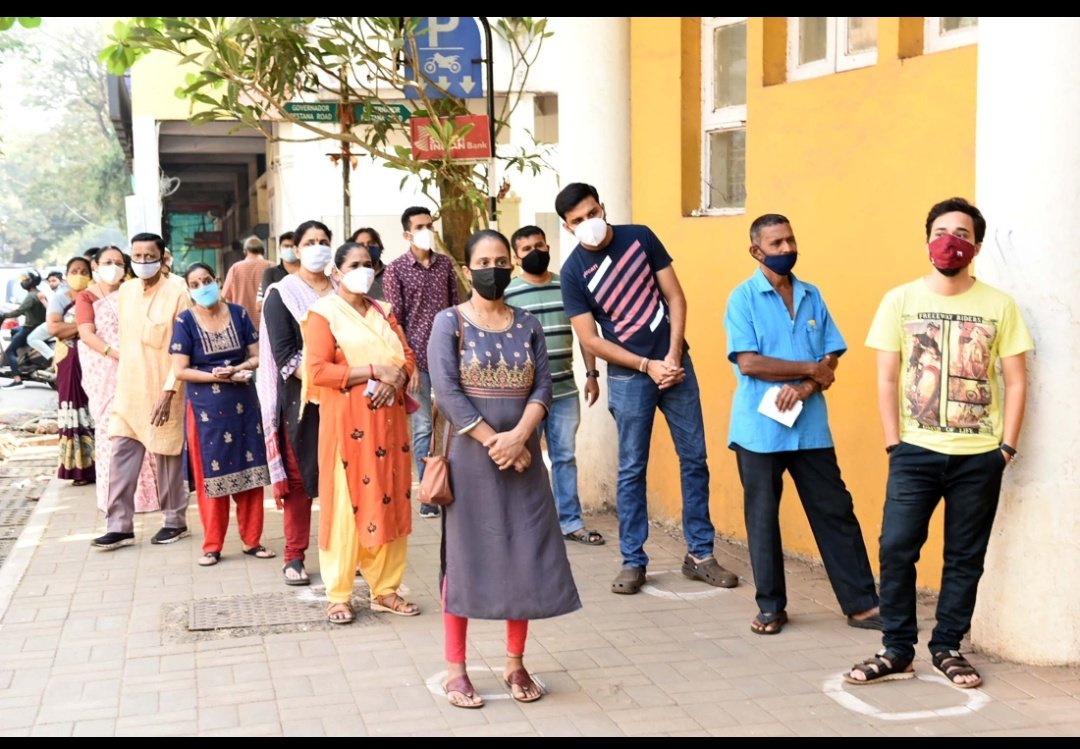Although most voters remained wary of sharing their ballot preferences even on polling day, two salient issues —unemployment and price rise — seeped out in conversations with those standing or walking near some of Goa’s polling booths.
The veritable cattle market of defections that followed the last assembly elections still rankles. The Congress won 17 of Goa’s 40 seats, and the incumbent BJP 13. But the BJP formed the government, after evidently buying over other MLAs. The Congress was finally left with only two MLAs by the end of that assembly’s term.
Many voters seemed uneasy about speaking openly about this trend (most either did not reveal their name, or asked not to be named), but several referred to defections obliquely as the (political) ‘corruption’ that was witnessed.
Another trend that became obvious while chatting with voters on polling day in Goa was that a silent resentment against ‘outsiders’ is in play. A relatively new party called Revolutionary Goans (RG) has energised some citizens here with passionate talk against Goa being taken over by ‘outsiders.’
A woman who runs a large vegetable stall near a market square first said there were far too many candidates to make out which of them might have the edge but then lowered her voice to speak of RG, her eyes shining now. A relatively young and idealistic employee from Aldona also spoke of RG with hope.
Ironically, this young man is extraordinarily helpful and sympathetic to those who come to him for work, including those from outside the state. And the vegetable seller’s support for RG is notable for three reasons: one, foreign and non-ethnic-Goan Indian residents of Goa are among her best customers. Two, she is based in North Goa, whereas RG is apparently stronger in south Goa. Three, she says she used to be a strong supporter of the BJP.
Congress remains strong in Goa
One has to wonder if, amid such strong localism, the charm of Prime Minister Narendra Modi, who has proved to be something of an electoral talisman for the BJP, will work in Goa. The large crowd who heard his campaign speech on the main ground in Mapusa city last Thursday was noticeably quiet.
One young man (evidently a Congress activist) outside a polling booth pointed out that people have been demanding a new bus stand in Mapusa for 20 years. While that hasn’t happened, a helipad suddenly came up for the PM to land. A minor controversy has been whipped up in the vicinity over whether the owner of the land had agreed.
Noticeably, religion doesn’t seem to influence politics much in Goa. Raghuraj Salgaonkar of Mandrem pointed out, soon after casting his vote on Monday morning, that Christians and Hindus here participate in celebrating each other’s festivals. There’s no religious divide, he said.
If Goa is any indication, the road to a ‘Congress-mukt Bharat’ could be a tough one. Many voters spoke on Monday of giving the Congress a chance, even while expressing dismay at the number of MLAs who switched sides after being elected on Congress tickets last time.
One noticed, however, that nobody seemed to speak of Rahul or Priyanka Gandhi, although both have visited Goa, and addressed audiences of various sorts here.
Rather, a knot of Congress supporters in Siolim town spoke glowingly of Michael Lobo, who recently returned from the BJP to the Congress, and said they would vote for his wife, who is the Congress candidate for Siolim. The candidate, ‘Delilah Lobo, works for everyone, particularly the poor, even before she joined a party,’ said a woman sarpanch in the area.
Networks of support of particular local leaders — such as the Lobo couple — are crucial, for what those individual leaders do for their neighbours and constituents tends to prove more salient at election time than the overall national (or regional) image of the party that fields them.
This sort of loyalty to candidates more than parties dovetails with the tendency of those elected switching parties in order to access power — and therefore the ability to get the administration to resolve their followers’ concerns.
Perhaps that is why nobody seemed concerned about, or even aware of, the recent sting videos that showed a TMC and a Congress candidate (separately) expressing readiness to switch sides in order to gain power after the elections. That’s a phenomenon that’s already in the public mind, even without that corroborating proof.
New and old also-rans
People, in general, were aware of the TMC and AAP campaigns but did not expect either to be able to win anywhere near a majority. Some thought those parties might be able to win a couple of seats, particularly where they have fielded a candidate who had already earned a name in another party before joining the newer alternative. Some thought that TMC could join a Congress-led coalition.
Some voters thought that these newer entrants might be able to win more seats after a couple more elections, but of course, much will depend on how much staying power they show between elections.
For the moment, established smaller parties such as the Maharashtrawadi Gomantak Party and Goa Forward (with which the Congress has shared seats for these elections) could fare better (albeit only in their strongholds) than TMC and AAP.
A resident of Mandrem constituency said his nephew had come from Maharashtra, where he is studying fine arts, just to cast his vote. Identifying himself only as Deepak, he said his nephew plans to make idols when he returns. One might think that a household that plans on making idols would be swayed by the BJP, but the uncle talks of rising prices before revealing that he is voting for Goa Forward, Congress’s partner.









